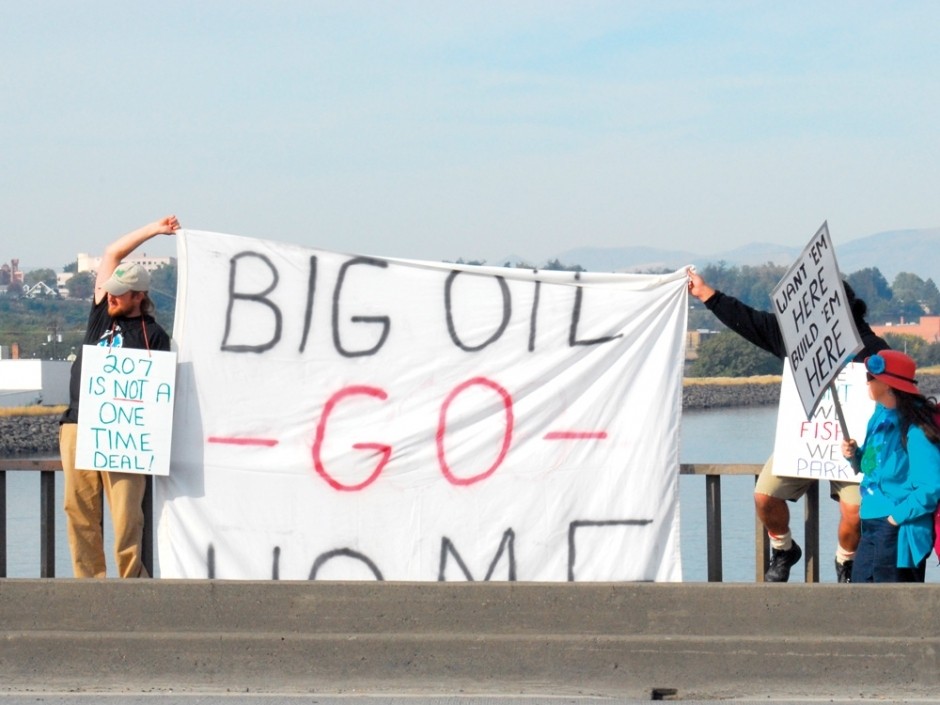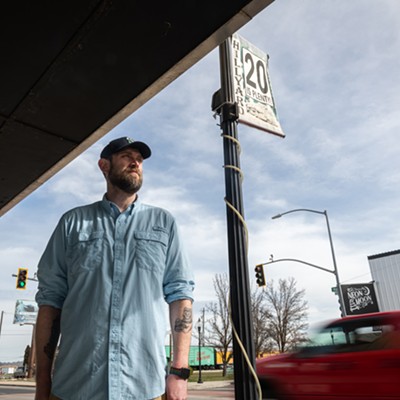Equipment too big for Interstate 90 is turning onto Spokane city streets as it heads toward Canada, an oil company spokesman says.
The loads are part of a large-scale mining project in Alberta by Imperial Oil. The company, part of ExxonMobil, has been trying to move the heavy equipment through the Northwest for years, but has faced stiff resistance.
The permit to move the equipment through the city was granted by the city administration at the behest of the state Department of Transportation, but Imperial Oil spokesman Jon Hardin says trucks may only move through the neighborhood between 11 pm and 5 am. So far, about 10 of the 250 loads, which weigh 200,000 pounds and are over 16 feet tall, have come through town, escorted by the Washington State Patrol, Harding says.
Secretary of Transportation Paula Hammond sent a letter to Mayor Mary Verner in September asking the city to “expedite approval” for the trucks to turn off of I-90, drive down Third Avenue for a short distance (because they can’t clear a pedestrian walkway at Regal Street), then get back onto the freeway.
While Verner, who has long touted her credentials as an advocate for green energy and environmental safeguards, signed off on the reroute through city streets, she says she did it grudgingly.
“I strongly object to the tar sands project, too,” Verner wrote in September, in response to a constituent asking her to reconsider her decision. Instead of commenting for this article, Verner supplied The Inlander with the email exchange. “However, I have no legal position to deny the movement of these loads through a few blocks of City street, especially when the state already has granted approval for these shipments to move over miles and miles of state roads.”
Verner told the constituent, Monique Kovalenko, that Third Avenue is often used as a route for trucks carrying over-sized cargo but wrote that she insisted these carriers be bonded and insured against any damage to city infrastructure.
“We make no distinction for the contents of the loads and
have no basis to deny use of our streets based on what the trucks are
carrying,” Verner wrote. “Commonly, for example, trucks carrying
windmill blades must divert off of I-90 to use this section of City
street.”
The plan by Imperial Oil, Canada’s largest oil company, to mine oil-rich bitumen from northeastern Alberta province has been met with controversy, as has another plan to install a new pipeline, the Keystone XL, from the oil fields down to ports on the Gulf of Mexico.
Opponents of the project say the strip mining required to extract bitumen from the Kearl Oil Sands makes the product “dirty oil” because of the amount of greenhouse gases it produces. Activists across the country have railed against the pipeline, notably during some of President Obama’s fundraisers.
The activists’ frontline is currently in Nebraska, where activists are pressuring the state legislature to oppose the pipeline’s route through their state and over an important source of drinking water.
Supporters, such as Canadian Environmental Minister Peter Kent, argue that oil sands are “ethical oil,” less polluting than they’ve been made out to be and free from the taint of oppressive but oil-producing overseas regimes.
Since 2010, opponents in Washington, Idaho and Montana have opposed the permitting and road expansions necessary to get the goods up to Canada.
In Moscow, Idaho, several protesters were arrested in August for blocking megaloads that went through the town from the port of Lewiston, and the mayor of the town authored a resolution opposing the transport.
Center for Justice attorney Rick Eichstaedt, who also works with the Spokane Riverkeeper, says that by approving the transport quietly, Verner missed an opportunity to take a similar stand on this issue.
“What’s disappointing is that this is a pretty big deal that other communities have stopped,” Eichstaedt says. “Even if she has limited authority, she should speak out about it. There wasn’t any sort of community dialogue about this, wasn’t any sort of statement.”
Eichstaedt believes Verner was pressured by the state transportation department and officials from ExxonMobil, which owns Imperial, to approve the transit. It’s a worrying move, he says, given that the city could also soon be traversed by coal-laden trains heading west towards export terminals on the coast, which he opposes.
“Maybe we’re just afraid to oppose things here,” he says. “I don’t know if there’s some sort of financial benefit that was put on the table. I don’t know what we gain as a community.”
In her email, Verner called the tar sands project “an environmental disaster in every regard” but argued that resisting the DOT would have resulted in a costly lawsuit that would devour money needed for, ironically, protecting the environment.
“I barely have the budget to continue environmental protection efforts already under way,” Verner wrote. “Regrettably, merely refusing access to a short stretch of frontage road in Spokane will not undo the tar sands fiasco.”
Daniel Walters contributed to this report.





















